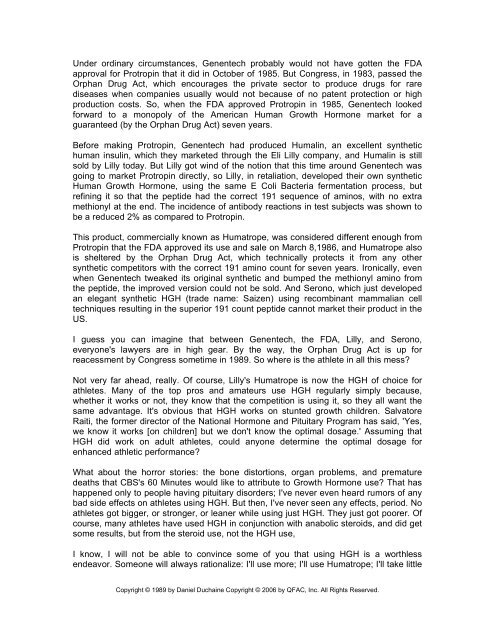Underground Steroid Handbook 2
Create successful ePaper yourself
Turn your PDF publications into a flip-book with our unique Google optimized e-Paper software.
Under ordinary circumstances, Genentech probably would not have gotten the FDA<br />
approval for Protropin that it did in October of 1985. But Congress, in 1983, passed the<br />
Orphan Drug Act, which encourages the private sector to produce drugs for rare<br />
diseases when companies usually would not because of no patent protection or high<br />
production costs. So, when the FDA approved Protropin in 1985, Genentech looked<br />
forward to a monopoly of the American Human Growth Hormone market for a<br />
guaranteed (by the Orphan Drug Act) seven years.<br />
Before making Protropin, Genentech had produced Humalin, an excellent synthetic<br />
human insulin, which they marketed through the Eli Lilly company, and Humalin is still<br />
sold by Lilly today. But Lilly got wind of the notion that this time around Genentech was<br />
going to market Protropin directly, so Lilly, in retaliation, developed their own synthetic<br />
Human Growth Hormone, using the same E Coli Bacteria fermentation process, but<br />
refining it so that the peptide had the correct 191 sequence of aminos, with no extra<br />
methionyl at the end. The incidence of antibody reactions in test subjects was shown to<br />
be a reduced 2% as compared to Protropin.<br />
This product, commercially known as Humatrope, was considered different enough from<br />
Protropin that the FDA approved its use and sale on March 8,1986, and Humatrope also<br />
is sheltered by the Orphan Drug Act, which technically protects it from any other<br />
synthetic competitors with the correct 191 amino count for seven years. Ironically, even<br />
when Genentech tweaked its original synthetic and bumped the methionyl amino from<br />
the peptide, the improved version could not be sold. And Serono, which just developed<br />
an elegant synthetic HGH (trade name: Saizen) using recombinant mammalian cell<br />
techniques resulting in the superior 191 count peptide cannot market their product in the<br />
US.<br />
I guess you can imagine that between Genentech, the FDA, Lilly, and Serono,<br />
everyone's lawyers are in high gear. By the way, the Orphan Drug Act is up for<br />
reacessment by Congress sometime in 1989. So where is the athlete in all this mess?<br />
Not very far ahead, really. Of course, Lilly's Humatrope is now the HGH of choice for<br />
athletes. Many of the top pros and amateurs use HGH regularly simply because,<br />
whether it works or not, they know that the competition is using it, so they all want the<br />
same advantage. It's obvious that HGH works on stunted growth children. Salvatore<br />
Raiti, the former director of the National Hormone and Pituitary Program has said, 'Yes,<br />
we know it works [on children] but we don't know the optimal dosage.' Assuming that<br />
HGH did work on adult athletes, could anyone determine the optimal dosage for<br />
enhanced athletic performance?<br />
What about the horror stories: the bone distortions, organ problems, and premature<br />
deaths that CBS's 60 Minutes would like to attribute to Growth Hormone use? That has<br />
happened only to people having pituitary disorders; I've never even heard rumors of any<br />
bad side effects on athletes using HGH. But then, I've never seen any effects, period. No<br />
athletes got bigger, or stronger, or leaner while using just HGH. They just got poorer. Of<br />
course, many athletes have used HGH in conjunction with anabolic steroids, and did get<br />
some results, but from the steroid use, not the HGH use,<br />
I know, I will not be able to convince some of you that using HGH is a worthless<br />
endeavor. Someone will always rationalize: I'll use more; I'll use Humatrope; I'll take little<br />
Copyright © 1989 by Daniel Duchaine Copyright © 2006 by QFAC, Inc. All Rights Reserved.


